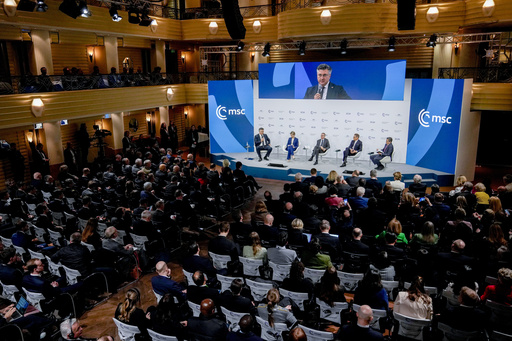
MUNICH — On Sunday, leaders from Europe took decisive steps to respond to the proactive U.S. efforts aimed at resolving the ongoing conflict between Russia and Ukraine. France declared that it would convene a meeting for leaders from across the continent, while Baltic countries pushed for additional measures to bolster Ukraine’s position ahead of any potential negotiations.
As Ukraine’s key military and financial ally alongside the U.S., Europe’s maneuvers come at a critical time. These actions coincide with the Trump administration’s rapid attempts to mediate a resolution nearly three years after Russia’s large-scale invasion. With Russian forces recently gaining some ground in eastern Ukraine, Finnish President Alexander Stubb advocated for increasing pressure on Russia through sanctions and asset freezes before engaging in any talks.
Stubb proposed a three-step plan that includes phases for “pre-negotiation,” a ceasefire, and long-term peace discussions. He emphasized, “The initial phase is the pre-negotiation, during which we must strengthen Ukraine’s military capabilities and apply intense pressure on Russia through sanctions and the freezing of assets. This strategic approach will ensure that Ukraine enters negotiations from a position of strength.”
In a move to consolidate efforts, French President Emmanuel Macron is assembling European leaders, with Foreign Minister Jean-Noël Barrot announcing an urgent “working meeting” focusing on Ukraine following recent developments from the U.S. Speaking to France-Info on Sunday, Barrot expressed confidence in a unified European stance: “Unity is now coalescing across Europe, reminiscent of the solidarity we felt during the COVID-19 pandemic.”
Macron’s call for consultations regarding Ukraine and broader security issues in Europe led to an informal meeting on Monday, which will involve leaders from Germany, the United Kingdom, Italy, Poland, Spain, the Netherlands, Denmark, and various top EU officials. The discussions hold the potential to evolve into different formats with the primary aim of uniting all stakeholders committed to European peace and security.
In Munich, U.S. President Donald Trump’s advocacy for a swift resolution to the war in Ukraine raised concerns and uncertainty among European leaders. Following a conversation with Russian President Vladimir Putin, Trump suggested they may meet soon to negotiate a peace agreement concerning Ukraine, giving reassurance to Ukrainian President Volodymyr Zelenskyy regarding his involvement in future discussions. However, reports indicate that European countries may not play a role in these negotiations.
“He shouldn’t be underestimated as a negotiator. I believe Putin finds the situation concerning,” Stubb remarked. “Europe’s responsibility now is to demonstrate its value to the Americans and regain an active role in the discussion.” He emphasized that Europe must prioritize action over dialogue.
Latvia’s President Edgars Rink?vi?s echoed Stubb’s sentiment, stressing that a strong European front would garner American interest. “If we demonstrate strength and offer meaningful contributions, we will capture the attention of the United States,” he stated. He also highlighted an important announcement from Ursula von der Leyen regarding a proposal to waive certain EU budget rules to facilitate increased defense spending in light of the crisis. “I propose employing an ‘escape clause’ for defense investments, enabling member states to elevate their defense budgets in a controlled manner,” von der Leyen explained.
Throughout the three-day Munich Security Conference, diplomatic activities spanned numerous topics, including politics, trade, and security. Ukrainian President Zelenskyy called for the formation of a “European armed forces” to counteract an aggressive Russia, which poses a threat to the 27-nation EU as well. In an NBC interview, Zelenskyy voiced alarms, sharing intelligence that suggested Putin is preparing to train 150,000 troops, mainly on Belarusian territory, further exacerbating concerns about Russia’s intentions.
On Saturday, Zelenskyy noted that he had instructed his ministers to withhold approval for a draft agreement permitting U.S. access to Ukraine’s rare earth minerals, citing an imbalance favoring U.S. interests. This proposal was pivotal during discussions with U.S. Vice President JD Vance, according to senior Ukrainian officials, who labeled Zelenskyy’s decision as somewhat short-sighted.
Japanese Foreign Minister Takeshi Iwaya later approached U.S. Secretary of State Marco Rubio, seeking exemptions for Japan from steel and aluminum tariffs, along with reciprocal tariff measures. Iwaya indicated that he also addressed automobile tariffs, although details were sparse concerning potential impacts on Japan’s automotive sector, which could be significant.

